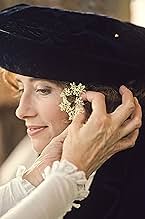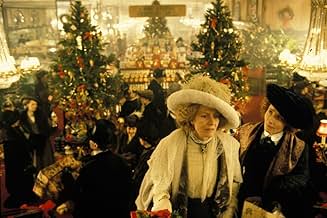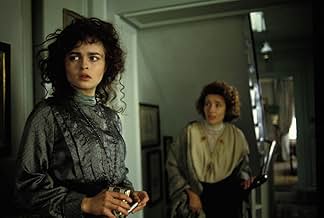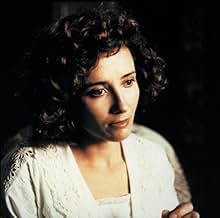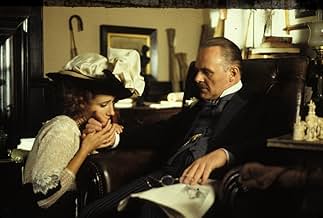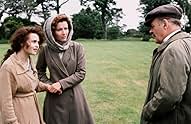CALIFICACIÓN DE IMDb
7.4/10
38 k
TU CALIFICACIÓN
Un hombre de negocios intenta frustrar los intentos de su esposa de donar parte de su propio legado a otra mujer de clase más baja.Un hombre de negocios intenta frustrar los intentos de su esposa de donar parte de su propio legado a otra mujer de clase más baja.Un hombre de negocios intenta frustrar los intentos de su esposa de donar parte de su propio legado a otra mujer de clase más baja.
- Dirección
- Guionistas
- Elenco
- Ganó 3 premios Óscar
- 32 premios ganados y 49 nominaciones en total
- Dirección
- Guionistas
- Todo el elenco y el equipo
- Producción, taquilla y más en IMDbPro
Opiniones destacadas
The literary period piece is a difficult genre to master, requiring a difficult balancing between restraint and flowing emotion. Few films effectively achieve this as beautifully as Merchant-Ivory's astounding HOWARDS END, making it probably the best period film of the 1990's. The film juxtapositions the intellectual, emotionally unhindered Schlegel sisters against the restrained, imperious Wilcox family, and, for good measure, mixes in the differing attitudes toward class emerging early in the century. What could quite easily have been a dry study in the cultural dynamics of pre-WWI England becomes an enveloping tale, thanks in no small part to the performances by Hopkins, Emma Thompson, and Vanessa Redgrave, whose Ruth Wilcox remains enigmatic after every viewing. The emotions ringing through by film's end - not to mention its astoundingly pointed social criticism - give the film its power, a power missing even from Forster's rambling, distant novel. And this story is nestled amongst some of the most beautiful art direction, music, and cinematography to ever grace the screen. The haunting journey to HOWARDS END is one few other recent films can rival.
Here is another example of what the British are best at in film-making. Based on E.M. Forster's novel `Return to Howards End' this film is more or less a set piece in the strictest period-piece tradition, and thus in style is somewhat akin to that great TV series `Return to Brideshead' and even Robert Altman came up trumps with his splendid `Gosford Park' which most definitely takes its well-earned place alongside such classical pieces of this genre.
Likewise, `Howards End' relies heavily on British actors who have worked their way up through live theatre: it is here that you get the best interpretations, the best performances, admirably shown in so many films made on both sides of the Atlantic. If Vanessa Redgrave has long since been a legend among British actresses, Emma Thompson is no lesser performer, and as to the pedigree of Helena Bonham-Carter there can be no arguing. Anthony Hopkins is at least up to the mark in his always sober readings in these kinds of films.
The Bonham-Carter family were well known in the fashionable circles of 1930's London high-society life, for their extravagant soirées and philanthropic sponsoring of young artists, especially musicians, similarly to the Sitwell family from their Chelsea home. Thus it is hardly surprising that Helena Bonham-Carter finds these kinds of rôles admirably suited to her - A Room with a View, anything Shakespearean, among other select `comedies'. Prunella Scales is a grand old lady of theatre, cinema and television, and I can remember her offerings back in the late fifties-early sixties especially on radio programmes.
Beautifully filmed in mostly Oxfordshire and in several places in London, the film also has a few scenes on the coast, possibly Dorsetshire or more probably the south coast of Devon, surprisingly not included in IMDb's very detailed listing of locations. Richard Robbins' music seemed to be heavily influenced by Philip Glass at times, which seemed a misfit, though it was nice to hear a few snatches by Percy Grainger, as well as a version for four hands on the piano of Beethoven's Fifth Symphony, possibly one of those tremendous transcriptions which Franz Liszt carried out.
The dialogues are mostly exquisitely delivered, with that peculiarly British panache and timing, though slightly spoiled in this recent re-viewing as there were some untimely cuts on the copy in question. However, the story holds its line and is faithful to E.M. Forster's original concept. He has long been one of the greatest of British novelists, with such works as `A Passage to India', `Where Angels Fear to Tread' and `A Room with a View' to his credit, for serious readers of real literature.
This film version maintains that seriousness for people interested in real play-acting.
Likewise, `Howards End' relies heavily on British actors who have worked their way up through live theatre: it is here that you get the best interpretations, the best performances, admirably shown in so many films made on both sides of the Atlantic. If Vanessa Redgrave has long since been a legend among British actresses, Emma Thompson is no lesser performer, and as to the pedigree of Helena Bonham-Carter there can be no arguing. Anthony Hopkins is at least up to the mark in his always sober readings in these kinds of films.
The Bonham-Carter family were well known in the fashionable circles of 1930's London high-society life, for their extravagant soirées and philanthropic sponsoring of young artists, especially musicians, similarly to the Sitwell family from their Chelsea home. Thus it is hardly surprising that Helena Bonham-Carter finds these kinds of rôles admirably suited to her - A Room with a View, anything Shakespearean, among other select `comedies'. Prunella Scales is a grand old lady of theatre, cinema and television, and I can remember her offerings back in the late fifties-early sixties especially on radio programmes.
Beautifully filmed in mostly Oxfordshire and in several places in London, the film also has a few scenes on the coast, possibly Dorsetshire or more probably the south coast of Devon, surprisingly not included in IMDb's very detailed listing of locations. Richard Robbins' music seemed to be heavily influenced by Philip Glass at times, which seemed a misfit, though it was nice to hear a few snatches by Percy Grainger, as well as a version for four hands on the piano of Beethoven's Fifth Symphony, possibly one of those tremendous transcriptions which Franz Liszt carried out.
The dialogues are mostly exquisitely delivered, with that peculiarly British panache and timing, though slightly spoiled in this recent re-viewing as there were some untimely cuts on the copy in question. However, the story holds its line and is faithful to E.M. Forster's original concept. He has long been one of the greatest of British novelists, with such works as `A Passage to India', `Where Angels Fear to Tread' and `A Room with a View' to his credit, for serious readers of real literature.
This film version maintains that seriousness for people interested in real play-acting.
Howard's End is not an easy movie to sit through if you do not typically watch period films. The language and euphemisms are very old fashioned (1910). But if you really sit back and watch the story unfold you will become engrossed. The crafting of the story by Merchant Ivory is impeccable. They tell the story so visually that you may not notice how physically alike Margaret Schlegel is to Ruth Wilcox in carriage and deportment, but the light-bulb goes off when the housekeeper of Howard's End mistakes Margaret for Ruth. The story itself is so quiet and brilliant that you don't realize something so very profound has happened until the credits roll. Every performance is amazing, but Emma Thompson (she won the Best Actress Oscar) and Vanessa Redgrave stand out. Their scenes together are so full of nuances that it's hard to take it all in during a first viewing.
For those who want to watch an intelligent, lovely-to-look-at motion picture, it doesn't get much better than this. The film tells the story of two sisters, of limited but respectable means, who collide with the world of the very rich in Edwardian England. One sister benefits from the acquaintance with the wealthy Wilcoxes. The other is all but destroyed by it. Along the way, there are charming scenes of tea parties and music classes, elegant costumes, fantastic settings, and engaging conversations. There is also a sad, secondary storyline of a poor clerk and his wife who, unfortunately, slip into even more abysmal circumstances through no fault of their own. The ending is tinged with despair, even as it offers some hope for both of the sisters' futures. The film should be commended as well for the fine performances of Emma Thompson, Anthony Hopkins, Helena Bonham-Carter and others. Any discriminating film enthusiast will not want to miss this movie.
10sphinx-7
This is one of my all-time favorite movies. From the opening credits, superimposed over Vanessa Redgrave's skirt sweeping through the wet grass and flowers around Mrs. Wilcox's beloved Howards End, through to the final image of rural bliss, the cinematography is perfection. The costuming is amazing, the screenplay is adept, and the acting is stellar, to say the least. To have Emma Thompson, Helena Bonham Carter, Vanessa Redgrave, and Anthony Hopkins in one movie together is to see a true synthesis of talent, not to mention James Wilby and Samuel West. The scene where Leonard Bast goes walking into the field of blue flowers is breathtaking.
I recommend this film to anyone who loves Forster and who loves painterly cinematography. Also it is full of the finest performances by all of the actors involved.
I recommend this film to anyone who loves Forster and who loves painterly cinematography. Also it is full of the finest performances by all of the actors involved.
¿Sabías que…?
- TriviaDame Emma Thompson received a total of thirteen nominations for her role in this movie. She won in all of those events, which includes an Oscar, a Golden Globe, and a BAFTA as Best Actress.
- ErroresWhen Charlie and Dolly Wilcox are hiding from Margaret Schlegel in the castle, the scene closes with low angle wide shot of the castle with a view of the sky behind it, revealing an aircraft contrail. There were no aircraft capable of leaving high-altitude contrails in the time period this movie is set in.
- Citas
Margaret Schlegel: Will you forgive her as you yourself have been forgiven... you have had a mistress; I forgave you. My sister has a lover, you drive her from the house. Why can you not be honest for once in your life? Why can't you say what Helen has done, I have done!
Selecciones populares
Inicia sesión para calificar y agrega a la lista de videos para obtener recomendaciones personalizadas
- How long is Howards End?Con tecnología de Alexa
Detalles
- Fecha de lanzamiento
- Países de origen
- Sitio oficial
- Idiomas
- También se conoce como
- Howards End
- Locaciones de filmación
- Fortnum & Mason's, Piccadilly, Mayfair, Westminster, Greater London, Inglaterra, Reino Unido(where Ruth and Margaret do their Christmas shopping)
- Productoras
- Ver más créditos de la compañía en IMDbPro
Taquilla
- Total en EE. UU. y Canadá
- USD 26,126,837
- Fin de semana de estreno en EE. UU. y Canadá
- USD 52,568
- 15 mar 1992
- Total a nivel mundial
- USD 26,476,514
- Tiempo de ejecución
- 2h 22min(142 min)
- Color
- Relación de aspecto
- 2.39 : 1
Contribuir a esta página
Sugiere una edición o agrega el contenido que falta




